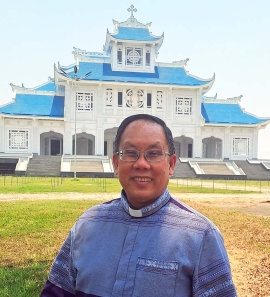The word ‘Church’ means ‘assembly’ or ‘convocation’ of all who believe in Jesus Christ. The Church was “born” on Good Friday as Jesus’ blood and water flowed from his side. At the descent of the Holy Spirit on Pentecost, the apostles began going out to proclaim their faith in the Risen Lord, to all the nations.
St. Paul referred to the church as the body of Christ (1Cor 12:12-14) because Christ is its head (Col 1,18). Believers, follow Christ, listen to Christ, do the work of Christ, and let Christ guide their steps, just as the head of the body does to the whole body. Through the action of the Holy Spirit, all members of the Church are mystically united in a hidden and real way to Jesus Christ, the one Mediator and the unique way of salvation (CCC 805; LG 7).
Just as Jesus Christ is both truly human and truly divine, the Church too is holy because it is the body of Christ. However, it is always in need of reform and renewal because its members are humans tainted by sin (UR 6). St Augustine emphasised that “the Church is not a museum for saints but a hospital for sinners”. The sins of some of the members of the Church should not diminish one’s love for the Church because it is on a journey and will not achieve perfection until the end of history (LG 48). “I see the church as a field hospital after battle”, insisted Pope Francis, “with its ability to heal wounds and to warm the hearts of the faithful” (Aug 19, 2013).
The Church has an essential and unbreakable relationship with the kingdom of God. It is the seed, sign and instrument at the service of God’s kingdom. The kingdom proclaimed by Jesus Christ is imperfectly yet authentically found in the Church. Just as Christ is united to the Church as his body, the Church is united to the kingdom as its seed. The Church points to the kingdom and bears witness to it by spreading Gospel values and fostering integral human development. While the Church anticipates the kingdom in a limited but real way, it is called to continually grow into the kingdom, which will reach perfection at the end of time.
In fidelity to the mission received from Jesus, the Church goes forth with urgency, joyfully sharing the Gospel which transforms and saves. It continually reaches out to the farthest corners of the earth, persisting without growing weary or losing heart in the face of challenges and obstacles. The Church exists not for itself but as a reflection of Christ’s light, its mission is to shine this light upon all peoples (LG 1) not through pressure, coercion, or proselytism, but with Christ-like closeness, compassion, tenderness and mercy. Since the Church continues the mission of Jesus Christ, it is a sign and instrument of God’s grace, the universal sacrament of salvation offered by Jesus Christ to all human beings. While acknowledging God’s work beyond the visible boundaries of the Catholic Church, “those who, knowing that the Catholic Church was made necessary by Christ, would refuse to enter or to remain in it, could not be saved” (LG 14).
Nevertheless, many elements of holiness and truth are also found outside the visible boundaries of the Catholic Church, in other separated Christian communities. These include the written Word of God; the life of grace; the virtues of faith, hope and charity and the interior gifts of the Holy Spirit (LG 8, 15; UR 3). The Holy Spirit uses these separated communities as a means of salvation. Their strength comes from the fullness of grace and truth that Christ entrusted to the Catholic Church. Thus, all these gifts come from Christ and lead to him and are in themselves calls to Catholic unity (LG 8; CCC 819).
The local Church’s role is to make present Christ’s saving mystery within its socio-cultural context. It embraces the local culture and makes Christ’s presence understandable within it. The formation of the local Church is not just a geographical expansion or a visible growth of an organization. Instead, it is the process through which the Church, as the universal sacrament of salvation, is made accessible to all peoples. In turn, every local church, even one consisting of recent converts, is missionary by its very nature and both evangelised and evangelising (RM 49).
Don Bosco expressed his love for the Church through his unconditional fidelity to the Pope, commitment to evangelise who do not know their faith or weak have left the practice of their faith, particularly the poor and abandoned youth, and his missionary commitment for those who have not yet heard the Gospel.
For Reflection and Sharing
1. How do I express concretely my love for the Church?
2. In what way can I personally grow in my missionary commitment?


